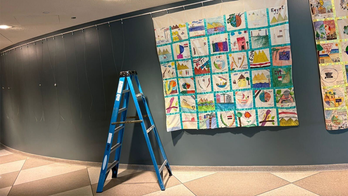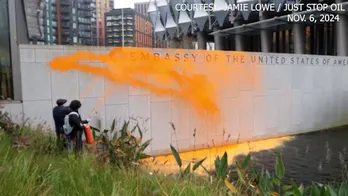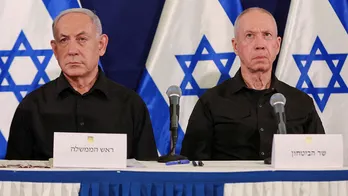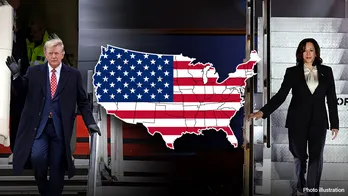Blinken arrives in Israel as the Gaza cease-fire with Hamas is extended another day
TEL AVIV, Israel — Hours after Hamas released another 16 captives in exchange for 30 Palestinians held by Israel, the two sides announced Thursday that they had agreed to extend their cease-fire in Gaza by at least another day to continue the hostages-for-prisoners swaps.
News of the extended pause in fighting came as U.S. Secretary of State Antony Blinken arrived in Israel and amid an early morning shooting at a bus station on the outskirts of Jerusalem, where gunmen opened fire, killing three Israelis. It is the first Palestinian attack on civilians since the Israel-Hamas war began last month.
Early Thursday, officials in Qatar, where the truce was negotiated, announced the extension of the pause in fighting under the same conditions agreed in the original deal a week ago. Both Israel and Hamas confirmed the revised deal, meaning more hostages are set for release later Thursday in return for Palestinians held in Israeli prisons.
Late Wednesday, Hamas released 10 Israelis and four Thai citizens that its fighters captured in the Oct. 7 attack launched from Gaza on Israeli border communities that killed around 1,200 people, Israel says. Hamas seized around 240 hostages in the assault.
Tens of thousands of Thais, Filipinos and people of other nationalities work on farms, construction and Israel's service sector.
Two Israeli-Russians were also released as part of what Hamas has described as a side-deal facilitated by Russian President Vladimir Putin, the third such release since the exchanges began on Friday.
Israel released 30 Palestinians in accordance with the cease-fire arrangement that calls for three Palestinians to be freed in exchange for every Israeli turned over by Hamas.
The latest move to prolong the truce that has temporarily halted Israel's bombardment of Gaza coincided with U.S. Secretary of State Antony Blinken's arrival in Israel to push for a more permanent resolution to the conflict.
Israel's prime minister, Benjamin Netanyahu, has repeatedly said that Israeli forces will resume operations to "crush Hamas" once the truce expires.
U.S. Secretary of State arrives in Israel
Blinken met Thursday with Israeli President Isaac Herzog, who thanked the U.S. "for the immense work it is devoting to the release of the hostages." He also mentioned by name the Bibas family, still being held hostage. Israel says the family, including the parents, a four-year-old girl and 10-month-old infant, were handed off by Hamas to another Palestinian militant faction, but Hamas says the mother and children were killed in an Israeli airstrike.
"Their whereabouts are unknown to us and we are demanding their immediate release," Herzog said.
Blinken said that "from day one" the U.S. has focused on trying to secure the hostages' release. He called the swaps of captives this week "a very positive development."
"It's also enabled an increase in humanitarian assistance to go to innocent civilians in Gaza who need it desperately," Blinken said. "So this process is producing results. It's important, and we hope that it can continue."
The Hostages and Missing Families Forum believes that Hamas still holds 145 hostages from Oct. 7, including 27 women and four minors — one girl and three boys all under the age of 18.
Bus stop shooting kills 3 in Jerusalem
The secretary of state also mentioned Thursday's attack near the entrance to West Jerusalem. He said the killings emphasize "the threat from terrorism that Israel and Israelis face every single day. And like you, my heart goes out to the victims of this attack."
Surveillance video from the attack shows two gunmen exiting a car and firing on a group of civilians waiting at a bus stop. A police statement, quoting medical sources, said three civilians were killed and 16 injured, by two assailants of East Jerusalem armed with an M-16 rifle and a handgun. It said the two "were neutralized on the scene shortly after the attack by two off-duty (Israel Defense Forces) soldiers and another civilian who fired at them."
No militant group immediately claimed responsibility.
In a statement posted on X (formerly Twitter), Netanyahu offered condolences to the families of the victims and said his government would expand its efforts to distribute weapons to Israeli civilians.
Also on X, war cabinet minister Benny Gantz said the bus stop attack "is further proof of our obligation to continue to fight with strength and determination against murderous terrorism, which threatens our citizens. In Jerusalem, Gaza, in Judea and Samaria, and everywhere," he wrote. Judea and Samaria are biblical names used to refer to the West Bank.
On Wednesday, Palestinian officials said Israeli troops killed an 8-year-old and a 15-year-old during a raid on the Palestinian city of Jenin. Israel's military says it killed two militants in the raid.
The U.N. chief says that Gaza aid is "inadequate"
In Gaza, where the week-long pause has temporarily halted Israel's relentless air-and-ground campaign against Hamas, at least 13,300 Palestinians have been killed since Oct. 7, according to Gaza's health ministry.
While the cease-fire has allowed desperately needed aid to reach many Gazans, United Nations Secretary-General António Guterres said Wednesday that the delivery of aid "remains completely inadequate to meet the huge needs of more than two million people."
The U.N. Office for the Coordination of Humanitarian Affairs (OCHA) said in its latest update that aid convoys, that had been unable to reach areas north of an informal line bisecting Gaza, continued through Wednesday.
It said that the Palestine Red Crescent Society (PRCS) and UNRWA, the U.N. relief agency that oversees the Palestinian territories, "delivered food and non-food items, medical supplies, and fuel to shelters hosting internally displaced persons (IDPs), as well as to warehouses and hospitals. The latter included two hospitals in Gaza city, Al Ahli and As Sahaba, which received a total 10,500 liters (nearly 2,800 gallons) of fuel, enough to operate generators for about seven days."
Aid distribution in areas of south Gaza, where the majority of internal displaced people are staying, include fuel for hospitals, water and sanitation facilities, as well as cooking gas that "has been entering daily from Egypt since the start of the pause," OCHA said.
NPR's Scott Neuman and Daniel Estrin reported from Tel Aviv.
Disclaimer: The copyright of this article belongs to the original author. Reposting this article is solely for the purpose of information dissemination and does not constitute any investment advice. If there is any infringement, please contact us immediately. We will make corrections or deletions as necessary. Thank you.







